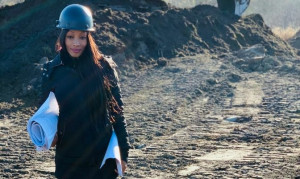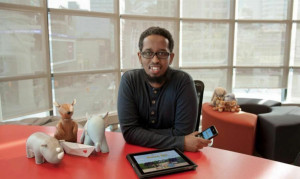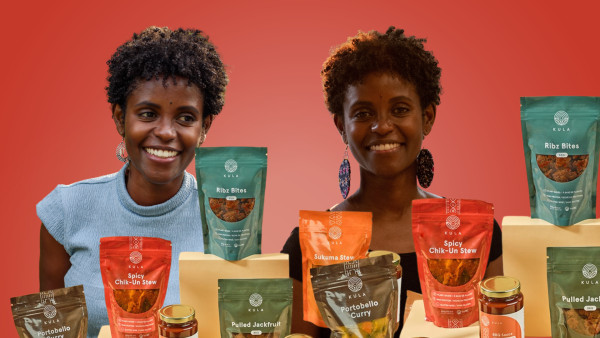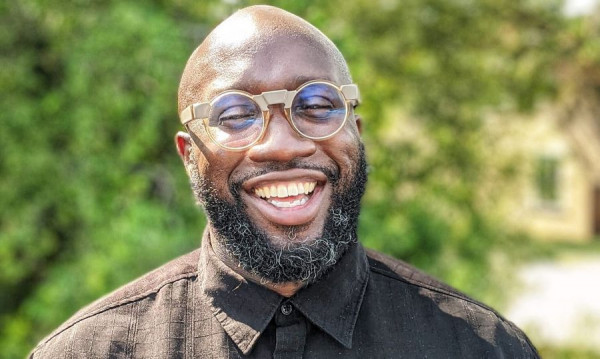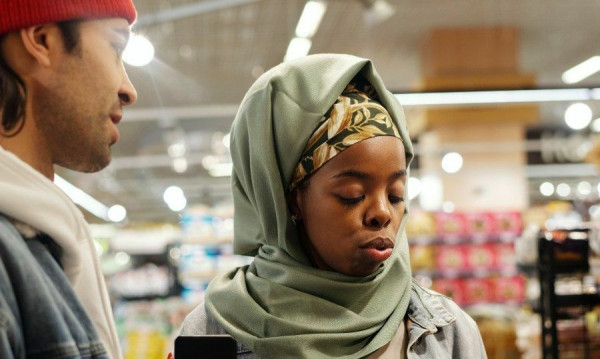I didn’t know any of those things until I sat down with the founder of B12Give, Tony Colley. B12Give (Be One To Give) is a for-profit social enterprise that delivers surplus prepared food from retailers to shelters and food banks. Tony was recently named a CBC Community Champion for his endeavours. He describes himself as an entrepreneur and an environmentalist but he didn’t always see himself that way.
Tony’s been a bartender, a dancer and an event manager at some of the hottest clubs in Toronto. He was ‘Tall Tony’. He’s also managed a multi-billion dollar real estate development portfolio as an analyst at a bank. But Tony’s also been food insecure with less than $300 to his name.
When I arrived at Tony’s apartment one cold February morning, he was in the middle of a cup of yogurt. I sat on the couch getting my recording ready as Dragon’s Den played on TV. Tony told me that he likes the show and hopes to be on it someday. I started our conversation by asking him to define food insecurity.
“In a nutshell, it's just a state of being without reliable access to or a sufficient quantity of affordable, nutritious food. There are 4 million food-insecure people in this country. Not all of them are homeless, a lot of them are the working poor. They get up every day to go to work, but they just don't have enough food either to feed themselves or their children. in my case, nobody knew I was going through this, I didn't tell anybody. In July 2016, my work experience consisted of 16 years with two national banks, four years as a business development manager for a nonprofit organization and two years as an entrepreneur. On the flip side, I’d been working weekends in nightclubs for 20 years. So I was working six days a week the entire time I was living in Toronto.
But on that day, in July 2016, I had $270 to my name, I had no job, I had a failed business venture and became food insecure. For the first time in my life at 44 years old, I had to apply for social assistance to have an income. And nobody knew. My mother knew because she's my mother but nobody around me. My roommate didn't know and she lived with me. So it was kind of crazy. I just hid it. She would go to work every day, she didn’t understand that I wasn't eating breakfast, she wasn't here. She knew that I was eating dinner every night because she saw me sitting here at this table and that's all that mattered.
I decided to put my money towards paying my bills and I would just go without breakfast. And it was the easiest way for me. I didn't expect to be food insecure but I needed to make a decision, eat or keep up appearances. And I decided to keep up appearances. So I just simply moved into another state of, I don't know, I guess acceptance of where I was and what I was dealing with. It affects you mentally, I fell into a depression.
During this time, my sister didn't know what I was dealing with. She knew that I was in a situation, but she didn't know how bad it was. But my sister would always say, “If He brings you to it, He'll bring you through it.” And so I said that to myself, so many times, throughout the process.
Was there a point of you recognizing that you were food insecure?
“I didn't recognize it right away. I mean, I knew I didn't have food anymore but my attitude was, “I'm just not eating breakfast.” That was it. I didn't label it as being food insecure because I had never been food insecure. I heard the term before but I had never put my situation and food insecurity together. It didn't hit me that I was food insecure until I read a story about food waste and saw the amount of food that Canada had. And within that study, it shared that there were roughly 4 million people who were food insecure and only 25% of those food insecure individuals were using food banks. So I was like, “Whoa, wait a minute. Should I be using the food bank?” But I didn't want to walk into a food bank, I was embarrassed. I mean, I was too embarrassed to tell my friends what was going on so for me to walk into a food bank, it would have been me actually recognizing that you don't have food.”
What are some of the things that you learned about food waste in Canada in terms of its impact on the environment and the economy?
“Well, right now we have a $49 billion food waste issue. And that's billions. Yes, that's annual. Right now 58% of all food produced in Canada is wasted. The majority of that, about 40% roughly is from producers and manufacturers. But typical households waste about $1700 worth of food every year. So that’s a lot of money.
Retailer food waste is 10% of our national food waste issue, which is $5 billion annually and this is the market that I'm targeting. 86% of that food isn't donated or redistributed which means it's going in the garbage. So that means they're only receiving 14% of the surplus food that we have in this country, which is crazy.
I first read the article on food waste in April of 2017, six to eight months into being food insecure. I said out loud after reading it, “they should feed this food to the homeless.” We have so much surplus food, who's gonna eat it other than people who need food? Then I never thought about it again.
In September 2016, I secured a part-time job working in hospitality for various catering companies. In September of 2017, I was scheduled to work an event with our largest catering company and at the end of a 12-hour shift, the CEO of the catering company offered me a job. Two weeks later, I was on-site managing my first event and at the end of that event, we had 100 box lunches left over. I was told to share the surplus with the staff and throw the rest in the garbage. And right away I was like, “wait, why are we throwing this food in the garbage?” So I was now witnessing the cause of our food issue right first hand in front of my face. It had never dawned on me before.
I couldn’t rescue all the food, so I just offered to rescue what I could that night and did so every event thereafter until July of 2018. And it was that moment that triggered a lot of frustrations, I was mad at myself for putting myself in this position. I knew that I couldn't stop rescuing the food because I had been doing it now for eight months. All I saw was surplus food going in the garbage and I was like “No, no, we can't do this.”
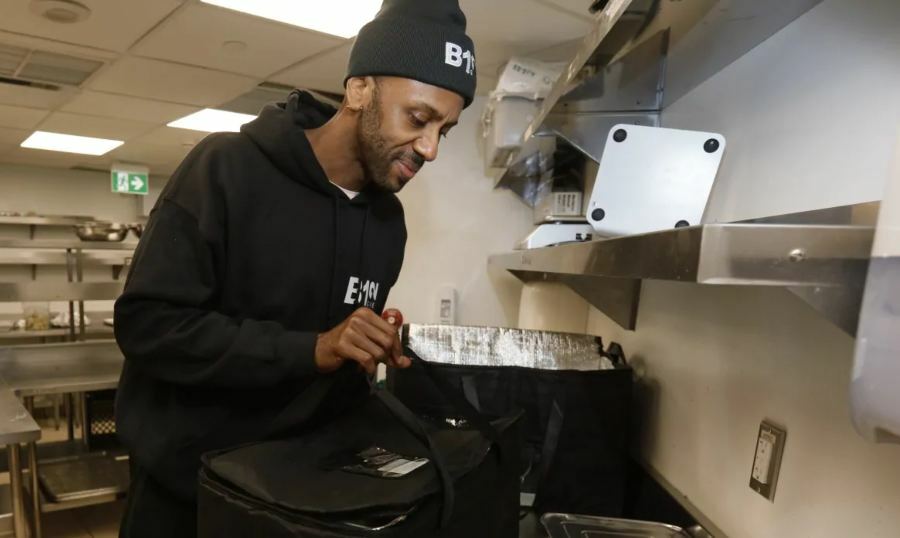 During that eight-month period when you're working at this catering company and doing food rescues on your own, what were your supervisors and coworkers saying about it?
During that eight-month period when you're working at this catering company and doing food rescues on your own, what were your supervisors and coworkers saying about it?
“So my interaction was primarily with the chefs. And when the chefs started seeing me do this, they were kind of like, “oh, wow, that's cool.” As time progressed, other managers started to see that I was doing this at the end of the event. They were like “oh, wow, you're taking this food, that's so nice.” But then eventually I would get phone calls from other managers that were managing other events around the city saying, “Listen, this client wants to donate the rest of their food, where can they take it?” So I saw that I was changing behaviours within the organization.
That means what I'm doing is starting to resonate with the other staff and they've been in this business for around 12 years. And they're the largest in Toronto, which means that they're the largest in Canada. So if I'm able to change their behaviours when it comes to food waste, I saw that other people started doing the same thing within the company. And then other people started to realize and it became sort of commonplace for a moment, people were now saying, “Tony is going to take this food at the end of the event. So don't throw it out.”
And that was really cool. Again, I wasn't anticipating it to get to that level. Because they've been throwing food out from the, you know, from the beginning. So for them to actually take the time and recognize what I was doing, and then take that moment and say, “Listen, Tony, we're going to have some food for you to take to the shelter,” it was nice to see.”
When you were doing these food rescues, were you ever able to see the impact you were having on the people receiving it?
"There was one moment that actually stays with me because it was the moment that I, for the first time, saw a soup kitchen live in action. It was late at night and I was coming from our main kitchen at Carlaw and Lakeshore and I was always on my bike. So I would bike to work, then we would drive one of the vehicles to the event and they would have to drive back to the kitchen. I would always go to this one shelter because it was directly on my way home. One day I walked in, and I had one of those large black garbage bags and I'm going to say eight to 10 aluminum containers of food. I had already done rescues and already delivered to this shelter in the past but earlier in the day, this is probably close to 11 o'clock or midnight.
There were about 30-40 people spread across the floor all in sleeping bags. And there was a gentleman at the counter getting his cup of soup, and I walked in and I said to the lead “this is all surplus food from an event.” She said, “Oh, what’s in the bag” and I started rhyming off what was in it. And the guys' eyes were like, “Oh my god, I can't believe it, you’re a godsend.” She said, “all we have to give them tonight is the soup.”
And a couple of people started to get up because they realized there was additional food as I was pulling the food out of the bag, onto the counter. And it's funny because one thing she said to me “was any of this vegan or vegetarian?” And initially, in my head, I'm like, woman this is surplus food. But she said to me, “The reason I asked is because we do have vegetarians here so we want to be able to serve everybody.” That’s something I never really considered or thought about before. But seeing the reaction from the gentlemen at the counter, her reaction, and then a couple people coming up and starting to “Wow” because they didn't have anything else other than that styrofoam cup of soup.
I left and that was the first time I cried because of what I was doing. I got overwhelmed with the fact that their reaction was so sincere and so humble, that they just were glad to have food that wasn't a styrofoam cup of soup. And I thought, “holy shit, look at what's actually happening here.” Because I had never interacted like this. So it was the first time I saw that this is what real life is like for these individuals.
I wasn't anticipating any of this at the time. It wasn't even part of my psyche, it really wasn't. I stumbled upon this. I tell people, and I still believe this to be true, I feel as though I was chosen to do this. Because food waste wasn't a thing for me. I worked in events for 20 years at various nightclubs, People call me ‘Tall Tony’. I’m known as this tall black guy that worked the front door of most of, if not all of, the biggest parties in the hottest clubs for 20 years.”
I find that interesting because you worked in nightclubs and you mentioned celebrities and when I think of nightclubs I think of things in excess. Then you're going from dealing with that to dealing with people who are, in some cases, in the complete opposite situation. Was there a point where you realized that your life or career had taken that kind of trajectory?
“Well, I knew my life changed the day after or the day when I only had $270 and no job. I knew that my life was different from that day forward. At that moment, I didn't know who I was or what I would become. Tall Tony was not the person who would be in a situation like this so I didn't want to be Tall Tony anymore. I resented people who called me Tall Tony. I didn't want to project that persona because Tall Tony is not supposed to be broke, Tall Tony is not supposed to be food insecure. it. So I went from A to Z overnight. I kind of had to wrap my head around it right away and go with that and not let it shake me or make me crumble."
How did you develop your food rescues into an actual business?
“I just kept doing more and more research because I was trying to figure out what the cost would be. How could we rescue more food? All we needed to do was develop a system to execute that. And I consider myself to be a smart man, I worked in banking for 16 years, I know I can run numbers. So, let's see what can we offer retailers as a service fee to do this because we can’t do it for free. I didn't want to become a nonprofit because nonprofits have to get money from guess who, the taxpayers.
By December 2017, I had the program ironed out, the only thing I wasn't able to determine was the pricing model. And in August, I partnered up with an annual initiative here in Toronto where I rescued 972 pounds of food. That was my very first rescue under the business. From start to finish, from September 2017 to now, I've rescued over 11,000 pounds of food feeding over 8,300 people.”
What are some of your long term personal and professional goals? I remember you mentioned last week that you have a five-year plan.
"I call food waste the new Black because everybody's paying attention to it all of a sudden. Food waste is 25 times more damaging to the environment than CO2 emissions and CO2 emissions are the pinnacle of what they see as a problem. Food waste creates and releases methane gas but people weren't thinking about food, people were thinking of CO2 emissions. And in the past five years, the food waste issue has ballooned by $18 billion.
So, my vision for this is to integrate myself into their operations through this method of targeting their surplus, prepared food. Even though that only makes 10% of our food waste issue, it's still $5 billion. If I can save $5 billion, sure, let's do it.
My program is strictly logistics and business development. If you sign up on Monday, we could have food moving on Tuesday. It’s that quick and easy. We’re eliminating all of those costs in between having a distribution centre, having those employees to sort all that food, having the resources necessary, then having drivers go back out and redistribute all of that food.
To use an organic waste collection company costs thousands of dollars a month whereas our most expensive program is $1500 dollars a month. And you're paying an organic waste collection company thousands of dollars to come and take this food to a landfill and it's going to rot.
I know that if I can set this up in Toronto, I could easily set it up in Halifax or in Montreal, and Calgary and just set them up because it's a very scalable platform. So the only thing I am doing is marrying all of that existing knowledge and innovation and doing something for the social good of the community, if not the country.”
After a nearly two-hour conversation, Tony and I were beginning to wrap up the interview. I’d just asked him about any advice he had for aspiring entrepreneurs, that’s when our conversation took another interesting turn.
“And I should share this because being a Black man, and this is ByBlacks, every accelerator that I pitched to were all white people. And I was ignored by all of them. Nobody took me in. I was involved with one accelerator but that was for an employment piece.
I went to Ryerson Social Venture Zone and I applied for their incubator program. I went to a few meetings and noticed I was usually the only Black person in the room. They told me I didn't get accepted in their incubator but they put me in the ideation stage. I went to the first meeting where we had to do a test case and answer questions based upon how you would apply these to your business, and the test case was on food waste. So she kind of put me on the spot, so I rhymed off a bunch of stuff and then other things would come up and I would speak up again. And then, the gentleman who was overseeing the entire process says, “you know, you need to make sure you do your research. You need to make sure you do this, you need…” blah, blah, blah. And then he looked me straight in the face and said, “I don't think your program will solve food waste.”
So, at the end of the meeting, I started talking to one of the program admins and I said, “Listen, I noticed that all of these people here have ideas. I have a fully developed business. So I'm not sure that I'm in the right space. You’re asking us to do homework and I did this homework last year, so I’m just not sure.” And she said, in this tone, “Well, if you don't think our program is beneficial, then you don't have to come back.” And I said, “Oh, I get it.”
And the mentor who tried to call me out wouldn't even look at me. He had his back to me the entire time. He was moving chairs around the room, he was doing this and that. And at one point she had made a comment like “you should go to climate ventures at CSI because maybe they have what you're looking for.” And I said, “Well, I'm actually a former board member of CSI. And I am now an official member of climate ventures. So I know who CSI is, I know what they're all about, which is why I'm already part of them and I've been a part of them for three years now.”
You know when white people talk to you like you don't know? I experienced that in that moment. So I took that and I left. And I wondered, “Is it because I'm Black?” I was like, “No, it can't be.” I was just oblivious because why would race come into play when I'm doing something that I felt was beneficial to the environment and to the community?
But to this day, he was the only person that I've met during this entire journey that ever said anything to me indicating that my program would not work. I walked out of that room and I was like, “well, this is how it's going to be, I'm going to come against obstacles because of my race.” And I never anticipated that.
Recently, I flew home to Halifax for my dad's birthday and the guy who sat beside me has been working in composting for 20 plus years, ironically. And then halfway through the flight said, “So what kind of work do you do?” And I said I launched an app that allows food retailers to redistribute their food to shelters at the end of the day. And he got it right away. He said, “Oh my god, you may put me out of business.”
And that's the same thing I told the guy from Ryerson. There will come a day that I will either meet him again or somebody will introduce us, or we will be in a mutual setting where something's happening around my business, and he's going to act like he doesn't know me and I’m going to remind him.
I'm a walking stereotype. I know it, I own it. It annoys me that everybody else treats me this way but it's something you just grow accustomed to. I'm a tall Black man every single day when I leave my house, so I'm going to experience life as a tall Black man every single day. But now I'm going to walk into these rooms and I'm going to shift perceptions. Because I'm doing something that’s beneficial and it's changing the landscape. I'm a disrupter to the food waste industry. And I know that and I'm going to ride that wave until I solve food waste."
Tony’s plan is to scale and build. Part of his five-year plan is to expand B12Give to cities outside of Toronto and across the world. Tony also hopes to include other initiatives under the umbrella of B12Give to address other social issues such as homelessness, education and social inclusion.
Marcus "Roi" Medford is poet, journalist, photographer's assistant and radio-show host studying journalism at the University of Toronto. Marcus has written for numerous publications including The Blueprint, the Toronto Observer and New Canadian Media. He has performed his poetry at multiple venues in Toronto and is publishing his first collection of poetry, "Book of Mars" later this year. You can check out Marcus on Twitter: @marcus_roi
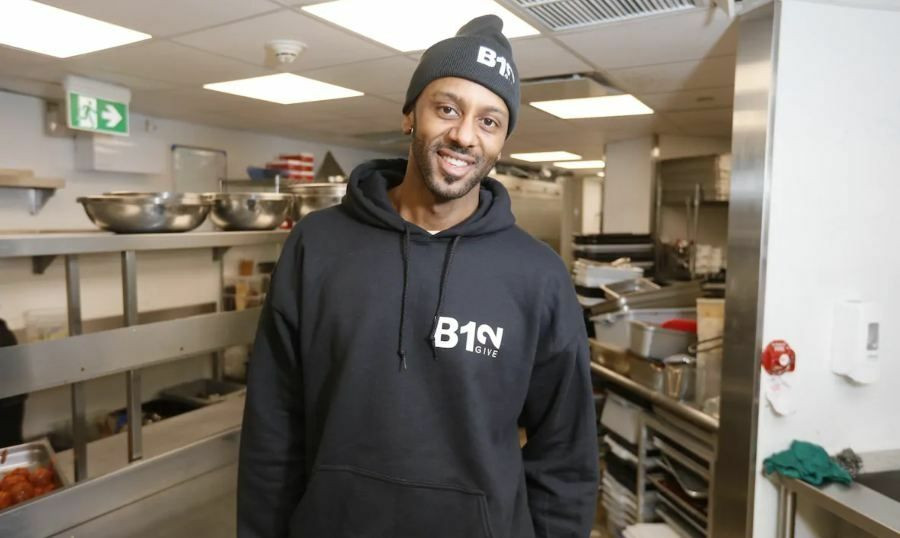
 By
By 




